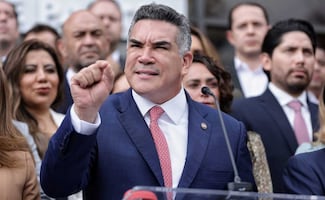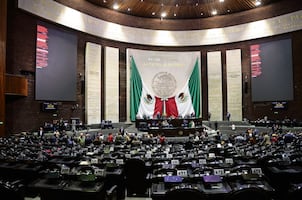Más Información

Alito Moreno afirma que México debe ser aliado de EU ante dictaduras como la de Maduro; "¡Venezuela libre ya!”

Morena va contra “Ley Esposa” en SLP que postula solo mujeres en 2027, señala Alcalde; prepara acción de inconstitucionalidad
With 49 votes in favor, 9 against, and 5 abstentions, the plenary session of the Mexico City Congress, approved the reform to the Penal Code to punish anyone who practices conversion therapies that use violent methods that threaten a person’s integrity.
This reform to Article 206 of the Penal Code that mentions “the criminalization of contracts, treatments, therapies or services, tasks, or activities that pretend to correct the sexual orientation, and gender identity or expression that undermines free self-determination.”
Those who force people to practice these therapies will be punished with two to five years in prison, in addition to 50 to 100 community work hours and the Mexico City Attorney General’s Office will have to prosecute them for grievance.
These sentences will be aggravated when the crime involves a minor and thus the Mexico City Attorney General will prosecute them ex officio.
The nine votes against the reform were from the PAN (6), the PES (2), and MORENA (1); nevertheless, most MORENA lawmakers voted in favor. At the discussion of the new bill, there were two reservations to the reformed articles, one of which was voted against while the other was voted in favor.
Minutes before the plenary session, the president of the Justice Administration Commission, Eduardo Santillán, mentioned in a news briefing, prior to the extraordinary period of sessions at the Mexico City Congress that will include the four verdicts that included conversion therapies—“that medical activity is not punished under any circumstance; the free exercise of the medical profession is guaranteed and the activity of religious ministers is not criminalized.”
The local lawmakers said that the approval of these reforms is a milestone for Mexico City regarding the protection of human rights.
For her part, Mexico City’s Mayor Claudia Sheinbaum endorsed the initiative to criminalize conversion therapies that is currently being debated at the Congress.
“I completely agree; I think these measures that want to change the sexual orientation of a person with therapy is from times of the Inquisition,” she said.
She mentioned that this kind of treatment does not correspond to the 20th-century health systems and even less, to the freedoms in Mexico City.
“It seems to us that they are measures that do not correspond to a city with rights; I think it is right for the Congress not to recognize these therapies because they do not correspond to scientific knowledge and the right to freedom,” she said.
sg
Noticias según tus intereses
[Publicidad]
[Publicidad]












